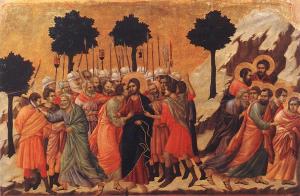
Many times, when Jesus spoke, his disciples did not understand what he meant. He often spoke in parables or with symbols, using ordinary things to represent spiritual truths. But they were not used to listening to such spiritual reflections, and so they, and many Christians afterward, misunderstood him, taking literally what was merely symbolic or even allegorical. Now, to be sure, his early disciples would later understand what he meant so that they could and would be able to preach the Gospel and write upon it, using such symbols themselves. This is why we find such symbols placed within historical narratives. They wanted careful readers to combine Jesus’ words with the symbols they added, so that such readers could embrace the transcendent point that Jesus and his disciples wanted to impart. [1]Perhaps one of the more interesting, and perhaps, greatest, examples of this is found in the Gospels when they describe what Jesus said, and the disciples did, right before his arrest, starting with when he said that those who did not have a sword should get one:
He said to them, “But now, let him who has a purse take it, and likewise a bag. And let him who has no sword sell his mantle and buy one. For I tell you that this scripture must be fulfilled in me, `And he was reckoned with transgressors’; for what is written about me has its fulfilment.” And they said, “Look, Lord, here are two swords.” And he said to them, “It is enough.” (Lk. 22:36-37 RSV).
Jesus’ words here should not to be taken in either a legalistic or a literal sense. If Jesus intended everyone who did not own a sword to buy one, sell their clothing if they needed the money, we should expect Christians throughout the centuries doing so, indeed, with some perhaps going around nude but with a sword. But we don’t get this. Indeed, Jesus quickly confirmed this is not what he meant when he stopped the disciples from buying swords when they told them they discovered they had two swords with them. He wouldn’t have stopped them if he wanted them to be armed. This is why, when many read this text, they conclude that what Jesus wanted his disciples to do was to detach themselves from material concerns and focus on their own spiritual state, getting a spiritual sword, as it were, to protect them from the trial which was to come. The disciples were not meant to take after the zealots, engaging violence to put Jesus in power. Jesus didn’t use violence to promote the kingdom of God. He didn’t want his followers to use violence to put him in power, nor to gain power for themselves. Though many of his disciples came from the zealots, he himself rejected their ways, at least in regard their willingness to use violence to establish the messianic kingdom. Jesus didn’t want Christians to believe that it was appropriate to use violence to promote themselves in the world. Peter, to be sure, did not initially understand this, which is why, when it was time for Jesus to be taken in by the authorities, he thought he could and would act with violence. His use of the sword led Jesus to rebuke him:
Then Simon Peter, having a sword, drew it and struck the high priest’s slave and cut off his right ear. The slave’s name was Malchus. Jesus said to Peter, “Put your sword into its sheath; shall I not drink the cup which the Father has given me?” (Jn. 18:10-11 RSV).
Matthew, without indicating it was Peter who drew his sword, completed the story by pointing out that the use of the sword, the use of weapons, only leads to more violence and death. That is, he records the warning that those who use the sword, or any weapons, and trust in them, shall find that they shall be destroyed by them, that is, they shall die, if not physically, at least spiritually, by the blood on their hands:
And behold, one of those who were with Jesus stretched out his hand and drew his sword, and struck the slave of the high priest, and cut off his ear. Then Jesus said to him, “Put your sword back into its place; for all who take the sword will perish by the sword. Do you think that I cannot appeal to my Father, and he will at once send me more than twelve legions of angels? But how then should the scriptures be fulfilled, that it must be so?” At that hour Jesus said to the crowds, “Have you come out as against a robber, with swords and clubs to capture me? Day after day I sat in the temple teaching, and you did not seize me. But all this has taken place, that the scriptures of the prophets might be fulfilled.” Then all the disciples forsook him and fled. (Matt. 26: 51-56 RSV).
If Jesus didn’t intend his disciples to actually acquire swords and use them, why did he tell those who didn’t have a sword to get one? This is a good question. Once we understand that we cannot take the passages at face value, we should discern that there is a spiritual or allegorical intent behind his statement. Swords are often used symbolically to represent the things we use in our internal spiritual struggle, that is, to fight against the darkness within us. Thus, swords often are used as symbols to represent spiritual tools, tools which we use to cut away defilement from ourselves, helping us to overcome sin, as, for example, can be seen in the writings of the Sufi Sharafuddin Maneri:
In a word, the very first step that a resolute disciple takes it to trample underfoot his own soul, and the first sword that he wields in anger is upon himself, not an infidel. Any wound that is inflicted on an infidel is only a bodily one and is made only for the sake of looting a person’s goods, but the wound inflicted on the ego goes to the very foundation of faith, and its only intention is to plunder the faith! Hence, any blow you strike should be directed toward your ego.[2]
While Jesus did not intend his disciples to buy swords, he probably knew that they had two with them (if the story is to be taken literally). And so, even that fact could and would eventually be able to be used to reinforce the spiritual reading of the event. For it was important that it was two swords which we found. It suggests that there can be more than one spiritual tool which we can use for our self-improvement, or, as St. Ambrose and many others said, they could also be used to represent the Old and New Testaments :
This seems wicked to many, but the Lord is not wicked, He Who when He could take vengeance chose to be sacrificed. There is also a spiritual sword, so that ye may sell your patrimony, purchase the Word [cf. Saint Matthew 13:44-46], whereby the innermost parts of the mind are clothed. There is also the sword of suffering, so that ye may lay aide the body, and with the coverings of the sacrificed flesh the crown of Holy Martyrdom may be bought for you, which ye can gather from the blessings of the Lord, Who foretold the highest crowns of all if anyone suffers persecution for righteousness’ sake [cf. Saint Matthew 5:10]. Finally, that ye may know that He spoke of suffering, lest He distress the spirits of the Disciples, He offered an example concerning himself, saying, “That this that is written must yet be fulfilled in Me, that with the wicked He reckoned” [Saint Luke 23:37]. Yet it still inspires that the Disciples offered two swords [cf. Luke 22:38], perhaps, indeed, one of the New, one of the Old Testament, with which we are armed against the deceits of the Devil [Ephesians 6:11]. Then, the Lord says, “It is enough” [cf. Saint Luke 22:38] as if nothing is lacking to him whom the teaching of each Testament has fortified.[3]
Thus, the two swords can be seen to represent spiritual truths which serve our own good. Even then, we must be careful. Such spiritual tools, just like swords, can be dangerous, if used inappropriately. For example, if we engage Scripture as a tool to attack others and denigrate them, rejecting their dignity, we would end up abusing Scripture, and when we do so, we would likely harm ourselves, defiling ourselves, just as much as if we used a sword, or a gun, or some other weapon to hurt others.
Now, it can be asked, if we believe the events presented in the Gospels give us real historical elements connected to and surrounding the passion of Christ, why would his disciples have swords with them? That is, as Jesus had already told them not to engage violence, and he had sent them out as innocent lambs bringing peace to those who would listen to them (cf. Lk. 10:3; Matt. 10:5-15), where did the swords come from? St. John Chrysostom suggested that they were connected with the last (mystical) supper with Jesus, and possibly were used with the meal itself. What he found important, however, is the way Jesus stopped them from getting more swords, showing that the disciples did not understand Jesus’ intent, which was confirmed in the way Jesus later rebuked Peter:
But whence were the swords there? They had come forth from the supper, and from the table. It was likely also there should be swords because of the lamb, and that the disciples, hearing that certain were coming forth against Him, took them for defense, as meaning to fight in behalf of their Master, which was of their thought only. Wherefore also Peter is rebuked for using it, and with a severe threat. For he was resisting the servant who came, warmly indeed, yet not defending himself, but doing this in behalf of his Master. [4]
Thus, when engaging Scripture and tradition, we must do so with care and concern, making sure we don’t support our ideology through eisegesis, that is, by taking a few particular verses out of context, warping their meaning so they can be made to represent our ideological preference. In the context of our discussion here, it should be clear tradition suggests Jesus did not want us to take up arms. Jesus, after all, taught non-violence. Scripture consistently represented him as the prince of peace, telling his followers to reject the ideology of power and the violence which flows from it. This is why, when Peter used a sword, Jesus had to rebuke Peter and remind him that violence only begets violence, indeed, that violence turns us away from the kingdom of God.
Sadly, time and time again, people have misunderstood what Jesus meant by buying a sword. They take what Jesus said extremely literal (ignoring the contradiction such an interpretation would bring when Jesus told his disciples two swords would be enough). Indeed, they read Jesus, and the Gospels in general, with such a poor hermeneutic, one which, if followed through, would bring about all kinds of bad practices, as Abba Serenus (as recorded by St. John Cassian) said:
But if certain other things were not made digestible through an allegorical interpretation and made tender by a probing spiritual fire they would in no way become healthful food for the inner man without a degree of corruption, and in eating them there would be more harm than good, as in this example: ‘Let your loins be girt and your lamps burning.’ And: ‘Whosoever does not have a sword should sell his tunic and by himself a sword.’ And: ‘Whoever does not take up his cross and follow me is not worthy of me.’ Some of the strictest monks, having indeed ‘a zeal for God, but not according to knowledge’ understood this literally. They made themselves wooden crosses and carried them constantly on their shoulders, evoking not edification but rather derision in all who saw them. [5]
Thus, St. Cyril of Alexandria stated:
Indeed, it is not fitting for us, who have been chosen to contend earnestly for piety towards God, to arm ourselves with swords against our enemies. Rather, we should be longsuffering. And though some people may wish to persecute us, when reviled we bless, when suffering we do not grumble, instead we give ourselves over to him who judges justly.[6]
While it would seem that Cyril and many of his own followers did not always take this to heart, as can be seen in the mob violence which surrounded St. Cyril, Cyril at least understood the error of such activity and proclaimed the right principle. He warned us of the potential sin and spiritual danger surrounding the embrace of the sword, or any other weaponry (like a gun).
When we read Jesus telling his disciples to get swords, we should realize Jesus didn’t want them, or any of us, to pick up weapons and use them. Rather, he wanted us to sell what we have, to give up, as it were, our inclinations and attempt to control and dominate the world for material gain, and defend ourselves with the spiritual sword which we gain as a result of such detachment. When Peter and the rest of his disciples didn’t understand this, he had to stop them from going out and actually buying sword. Similarly, then, when they tried to use the swords they had to defend themselves, thinking that when they did so, they would begin the fight which lead to the messianic kingdom on earth, he told them to put away their swords, that all they would do by using them is provide for their own destruction. We should listen to Jesus and make sure we don’t embrace the path of violence, thinking that Christians need to do so in order to assert themselves in the world. Jesus was the prince of peace. He warned us if we use the sword, we shall die by it. We must, of course, understand this spiritually, not literally, because it is clear, not everyone who embraces violence finds their temporal life ends in violence. That is, we must understand the warning to be similar to the one Scripture said was given to Adam concerning the forbidden fruit, a warning which was not about Adam’s temporal existence, but about his spiritual condition, a warning which indicated if he should take the forbidden fruit, he would experience the sting of death thanks to sin.
[1] We do not have to engage the question of the historical reliability of the Gospels. We can believe, if we want, that they perfectly represented the historical situation while acknowledging the spiritual intent behind the historical events, or we could believe that historical events are described symbolically so that they need not be taken literally.
[2] Sharafuddin Maneri, The Hundred Letters. Trans. Paul Jackson, SJ (New York: Paulist Press, 1980), 212 [Letter 53].
[3] Saint Ambrose, Exposition of the Holy Gospel According to Saint Luke. Trans. Theodosia Tomkinson (Etna, California: Center for Traditionalist Orthodox Studies, 2003), 409.
[4] St. John Chrysostom, Homilies On Matthew in NPNF1(10):502.
[5] John Cassian, The Conferences. Trans. Boniface Ramsey, OP (New York: Newman Press, 1997), 293 [Eighth Conference; Abba Serenus].
[6] St. Cyril of Alexandria, Glaphyra on the Pentateuch, Volume 1: Genesis. Trans. Nicholas P. Lunn (Washington, DC: CUA Press, 2018), 269.
Stay in touch! Like A Little Bit of Nothing on Facebook.
If you liked what you read, please consider sharing it with your friends and family!
N.B.: While I read comments to moderate them, I rarely respond to them. If I don’t respond to your comment directly, don’t assume I am unthankful for it. I appreciate it. But I want readers to feel free to ask questions, and hopefully, dialogue with each other. I have shared what I wanted to say, though some responses will get a brief reply by me, or, if I find it interesting and something I can engage fully, as the foundation for another post. I have had many posts inspired or improved upon thanks to my readers.











